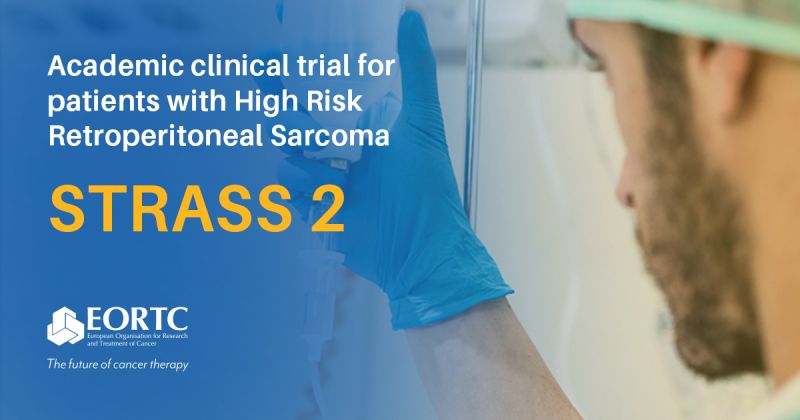
EORTC 1809 STRASS 2 / STREXIT 2: Pioneering Neoadjuvant Chemotherapy for High-Risk Retroperitoneal Sarcoma
EORTC 1809 – STRASS 2 / STREXIT 2: A Landmark Study on Neoadjuvant Chemotherapy for High-Risk Retroperitoneal Sarcoma
Retroperitoneal sarcoma (RPS) is a rare and complex cancer that originates in the retroperitoneal space, the area behind the abdominal cavity. It accounts for only 0.5 to 1.0 cases per 100,000 individuals, making diagnosis and treatment particularly challenging.
Currently, surgery is the cornerstone of treatment for RPS, and while it offers the potential for curative outcomes, long-term survival rates remain suboptimal. Five-year survival following surgery typically ranges from 60 to 70%, underscoring the need for more effective treatment options.
The EORTC 1809 STRASS 2 study, a randomized phase III trial, aims to address this gap by evaluating the potential benefits of adding neoadjuvant chemotherapy (chemotherapy given before surgery) to the standard surgical approach.

This is the first large-scale clinical trial to specifically investigate whether chemotherapy can improve disease control and survival in patients with high-risk retroperitoneal sarcoma.
Launched in June 2023, the EORTC 1809 STRASS 2 study marks a pivotal moment in the treatment of retroperitoneal sarcoma.
This trial investigates whether administering chemotherapy prior to surgery can improve patient outcomes, potentially leading to better disease control, reduced recurrence, and improved survival rates.
However, not all patients with RPS are eligible to participate in the STRASS 2 trial. To capture data from these real-world patients, the STREXIT 2 observational arm was introduced.
STREXIT 2 aims to gather valuable clinical outcomes data from individuals who are either ineligible for STRASS 2 or who choose not to participate in a randomized trial.
By comparing data from the STRASS 2 trial with that from STREXIT 2, researchers hope to enhance the understanding of treatment efficacy in a broader population.
The goal is to match patients from STRASS 2 and STREXIT 2 to strengthen the robustness of the trial’s findings.
This innovative approach integrates real-world evidence into a clinical trial setting, enriching the study population and providing a more comprehensive understanding of treatment outcomes in this rare cancer population.
The integration of real-world data into a randomized clinical trial is a game-changer, particularly in the context of rare cancers like retroperitoneal sarcoma.
The inclusion of STREXIT 2 into the ongoing STRASS 2 study allows for a more nuanced exploration of how different patient populations respond to treatment. By comparing these two arms, researchers aim to answer key questions about the effectiveness of neoadjuvant chemotherapy and its potential role in improving patient survival, quality of life, and long-term outcomes.
Moreover, a positive outcome from the STRASS 2/STREXIT 2 study could have significant implications for clinical practice. If neoadjuvant chemotherapy proves to be beneficial, it could shift the standard of care for high-risk RPS patients, improving survival rates and potentially reducing the risk of recurrence.
Additionally, the study will include a health economics analysis, which will assess the cost-effectiveness of this treatment approach. This is critical for understanding the economic impact of integrating chemotherapy into the treatment paradigm, not just for patients but also for healthcare systems.
The STRASS 2/STREXIT 2 study is a collaborative, multidisciplinary effort involving clinical oncologists, surgeons, health economists, and patient representatives.
The study design recognizes the complexity of treating rare cancers and the importance of diverse perspectives in shaping the future of care.
The inclusion of patient voices is particularly important, as it ensures that the treatment options being tested are not only clinically effective but also aligned with patients’ needs and preferences.
This collaborative approach has the potential to bring about meaningful changes in clinical practice, improving outcomes for patients with retroperitoneal sarcoma. Moreover, by addressing the economic aspects of treatment, the study could provide valuable insights into how best to allocate resources within healthcare systems, ensuring both clinical and economic sustainability.
The EORTC 1809 STRASS 2 / STREXIT 2 study represents a critical step forward in the quest to improve treatment for retroperitoneal sarcoma.
As the trial progresses, its findings could have a transformative impact on how this rare and difficult-to-treat cancer is managed.
With its combination of rigorous clinical research and real-world data, the study holds promise not only for improving survival rates and patient quality of life but also for enhancing the efficiency and sustainability of healthcare systems globally.
As we await the results, the STRASS 2/STREXIT 2 study serves as a powerful reminder of the potential for innovation and collaboration in the fight against rare cancers like retroperitoneal sarcoma.
By bridging the gap between clinical trials and real-world evidence, this study offers a hopeful outlook for patients facing this challenging diagnosis.
For further reading:
-
ESMO 2024 Congress
September 13-17, 2024
-
ASCO Annual Meeting
May 30 - June 4, 2024
-
Yvonne Award 2024
May 31, 2024
-
OncoThon 2024, Online
Feb. 15, 2024
-
Global Summit on War & Cancer 2023, Online
Dec. 14-16, 2023
